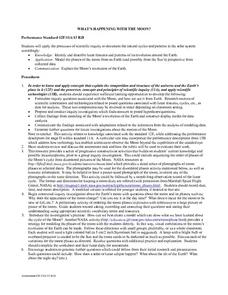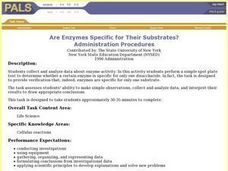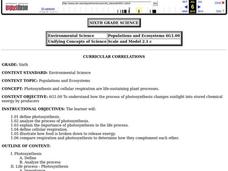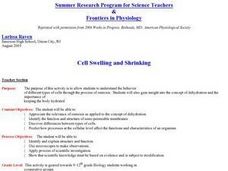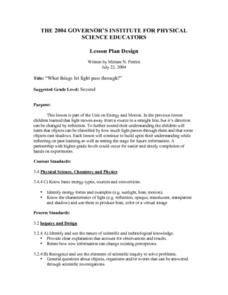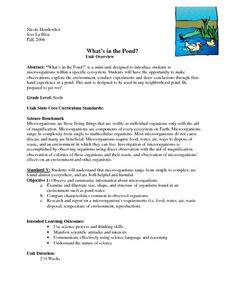Curated OER
Are Fruits And Vegetables Really Made of Cells?
Students design and carry out an exercise to determine if a given fruit or vegetable is composed of cells. They dissect out sections of the fruit or vegetable, prepare stained slides, and make observations under a compound microscope.
Curated OER
What's Happening With the Moon?
Young scholars review the process of scientific inquiry. Using this information, they identify the patterns and cycles of the moon as it revolves around the Earth. In groups, they model the phases of the moon from the Earth and Sun's...
Curated OER
Balloon Rocket
Students observe a balloon rocket and how it relates to Newton's Third Law of Motion. In this balloon rocket lesson plan, students make a balloon rocket out of balloons, clothespins, straw, fishing line, and duct tape.
Curated OER
Are Enzymes Specific for Their Substrates?
Students discover enzyme to substrate specificity. The experiment uses samples of glucose and lactose in combination with the enzyme lactase. Students observe the reaction between the lactose and the lactase; the lack of a reaction...
Curated OER
Using Spectrophotometers to Examine Photosynthetic Rates
Students examine how photosynthetic rates can change by using different qualities of light. They practice using spectrophotometer and the scientific method to detect the absorbance values in light treatments.
Curated OER
Bubble and Squeak
Students complete a unit on the chemical and technological processes of food preparation. They observe various experiments, describe changes in materials through cooking, identify safety and hygiene issues, and cook various recipes.
Curated OER
Electricity: Series and Parallel Circuits
Fourth graders explore electricity and electrical circuits. They explore series and parallel circuits using Christmas lights. Students pull lights out of each strand of lights. They observe the results when the light bulb is pulled out....
Curated OER
Properties of Matter: "Sink or Swim"
Third graders recognize that different materials have different properties which can be observed such as texture and bouyancy, and compare and contrast, through observation, ability of some objects to float because of action of...
Curated OER
Photosynthesis
Sixth graders are introduced to the process of photosynthesis by discussion and then by participating in an experiment. They then answer questions as independent practice project.
Curated OER
Utilizing Community Resources
Students gain an understanding of scientific methods and use process skills (such as observing, classifying, and predicting) to solve a problem. They develop an understanding of the need for natural preservation.
Curated OER
Cell Swelling and Shrinking
Students examine the concept of osmosis in relation to dehydration. They identify the function and structure of semi-permable membranes. They predict how certain processes can affect the characteristics of an organism.
Curated OER
Temperature and Enzymes
Students compare the times it takes the milk in each of two cups to curdle. They are told that an enzyme that is added to the milk, rennin, is involved in the natural curdling process of milk. Students are asked to consider what...
Curated OER
Phases of the Moon
Students use a simple physical model of the Earth, sun, and moon to understand why the moon changes phases from the perspective of Earthly observers. They hold up balls representing the moon in a room with a single light source to see...
Curated OER
Perception is not Always Reality
Seventh graders explore explanations of natural illusions. In this perception instructional activity students solve a problem by applying the process of science.
Curated OER
Growth of a Bean Documented by Child and Camera
Third graders photograph the growth of a bean plant and keep a daily written journal of observations. They drew, graphed and took notes on the plant growth which they compared to the photographic journal.
Curated OER
The Tadpole and the Frog
First graders examine the life cycle of the frog, and research frogs of the Nez Perce reservation and their requirements for survival. They observe the development of frog eggs and record their observations in science journals.
Curated OER
Color My World
Students identify colors created by mixing primary colors and describe the process. They then design a book using the colors of a given season entitled "Colors of the Season".
Curated OER
Separation of a Complex Mixture
Students develop a method to separate different types of mixtures. In this chemistry activity, students model the steps in the scientific method. They perform the experiment and analyze data.
Curated OER
The Forecast Factory
Students role play weather forecasting activities. They investigate weather forecasting processes such as equations, data analysis, announcing by role playing in a large lecture hall.
Curated OER
What things let Light Pass Through?
Second graders classify objects according to how well light can pass through them and predict how well objects will transmit light. They experiment with objects to verify predictions while collecting, recording, and interpreting data...
Curated OER
Root, Root, Root for the Nutrients
Students observe the growth of a seed, predict what will happen when seeds are planted without soil, and conduct an experiment using a hydroponics system.
Curated OER
Sun Shadow Cycles
High schoolers use diagrams to review how the Earth rotates around the sun. In groups, they use the same diagrams to explain how the sun shadows are produced and how they differ between seasons. They describe the Earth's rotation and...
Curated OER
What's in the Pond?
Sixth graders are introduced to microorganisms within a specific ecosystem and have the opportunity to make observations, explore the environment, conduct experiments and draw conclusions through firsthand experience at a pond. They also...
Curated OER
Wacky Wildlife World
Fourth graders research organisms in the environment in Kentucky and create brochures for the local area wildlife reserves. Individuals create brochures that include information on habitat, body characteristics, scientific class, role...



